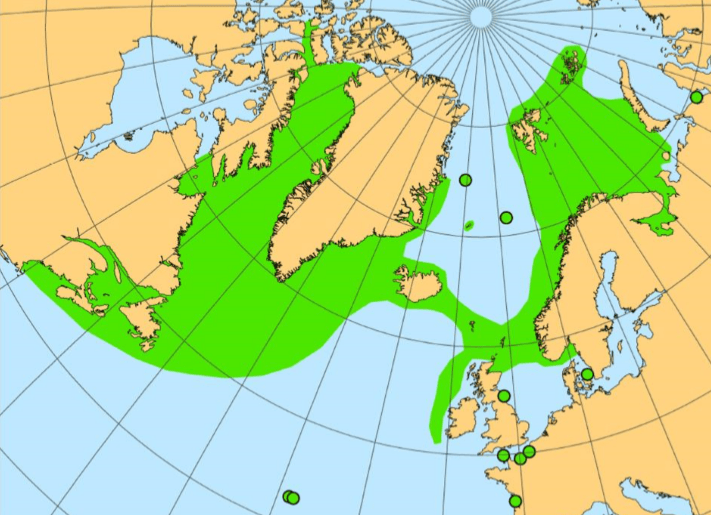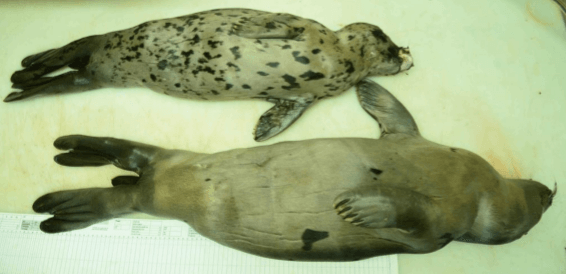Adaptations Equal Immortality – The Greenland Shark.
The Greenland shark is considered to be the longest living vertebrate on the planet, where estimates have suggested that it can reach a lifespan of 400 years. With the size of a great white shark and with strong adaptations to their environment, the Greenland shark is undefeatable.
Records show that the Greenland shark ( Somniosus microcephalus ) have been observed by humans since the late 1890’s or possibly earlier (Steffensen, 2017). From what we know, the Greenland shark is believed to be the largest fish in the Arctic where it can reach up to 516cm for females, 375cm for males and have a body weight of up to 1,100kg (Steffensen, 2017). The Greenland shark have been estimated to reach a lifespan of up to 400 years (Butler, 2016), where the females do not reach sexual maturity until the age of 150 years!
The Greenland shark have developed some extraordinary adaptations which is likely the reason for it to be such a long-lived animal. For instance, the shark has adapted its ability to live in cold waters in the Northern Atlantic regions (Figure 2) where the temperatures vary between -1.6°C to 16°C (GEERG, 2019). A benefit of living in cold waters like this is that there are limited predators lurking around, where the only confirmed predator of the Greenland Shark is the Sperm Whale ( Physeter macrocephalus).
The Greenland shark have also adapted to reach incredible depths! The shark is most commonly found in depths around 150m, but have also been recorded at a striking 2,200m! (Steffensen, 2017). The advantage of staying at this depth allows the shark to stay away from predators and limit the chances of ship strike (being hit by boats) and caught as bycatch by fishermen.
When observed, the Greenland shark is extremely slow moving, hence it has been called “the slowest moving shark in the world” (GEERG, 2019). The slow movement allows the shark to save its energy that is needed for the metabolic processes such as muscular activity, growth, and heat production.
Another fascinating adaptation is their skin, which is poisonous! Previous research explains how the chemical structure of their skin works as an “anti-freeze” which prevents the Greenland shark body from stiffening (GEERG, 2019). The flesh of the shark when eaten can often lead to intestinal discomfort and in extreme cases death, which will make predators second guess their dinner plans.
The diet of the Greenland shark is very fascinating! The prey that they eat varies from what region they belong to (Figure 2) and what food might be available (Steffensen, 2017). As mentioned before, the Greenland shark is a slow swimming animal, hence it is natural to think that they are scavengers that would eat left-over food and consume dead animals. However, in more recent years, evidence have shown that they are not solely feeding on other animal’s food scraps. Steffensen (2017) found a Greenland shark with two freshly ingested seals that seem to have been eaten whole (Figure 3). To minimise the effort put in to capturing food, it seems the Greenland shark would primarily scavenge on available food, but when it chooses to put in the effort and energy it can act as a hunter and consume larger prey.
Animals ability to adapt to their environments is critical for their survival. In the case of the Greenland shark, this species has shown us extraordinary adaptations that has allowed for its long lifespan and its existence throughout centuries. Through history and research, we have gathered much information about the Greenland shark. One of the challenges is that the shark spends most of its time in unreachable deep waters which limits close-up observations. There are for example still questions on how the Greenland shark can actively hunt for large prey when it is such a slow swimming animal. In conclusion, previous research has provided us with a good understanding of the Greenland shark and its way of life. Future research will continue to provide extraordinary findings and help us to answer our Greenland shark questions.
References:
Butler, P., 2016. A 400-Year-Old Shark Is The Latest Animal Discovery To Reveal The Secrets Of Long Life . The Conversation. Available at: < https://theconversation.com/a-400-year-old-shark-is-the-latest-animal-discovery-to-reveal-the-secret... ;
Greenland Shark Research (GEERG). 2019. Greenland Shark - Greenland Shark Research (GEERG) . Available at: < https://geerg.ca/greenland-shark/> ;
Steffensen, J.F., 2017. The Greenland shark (Somniosus microcephalus) (Doctoral dissertation, University of Copenhagen).
SHARE THIS ARTICLE
















